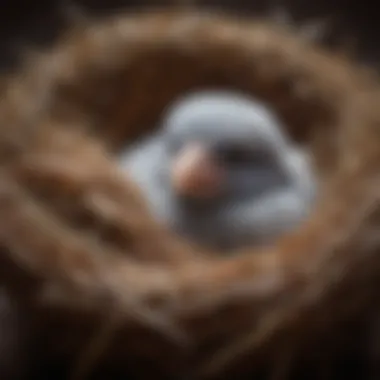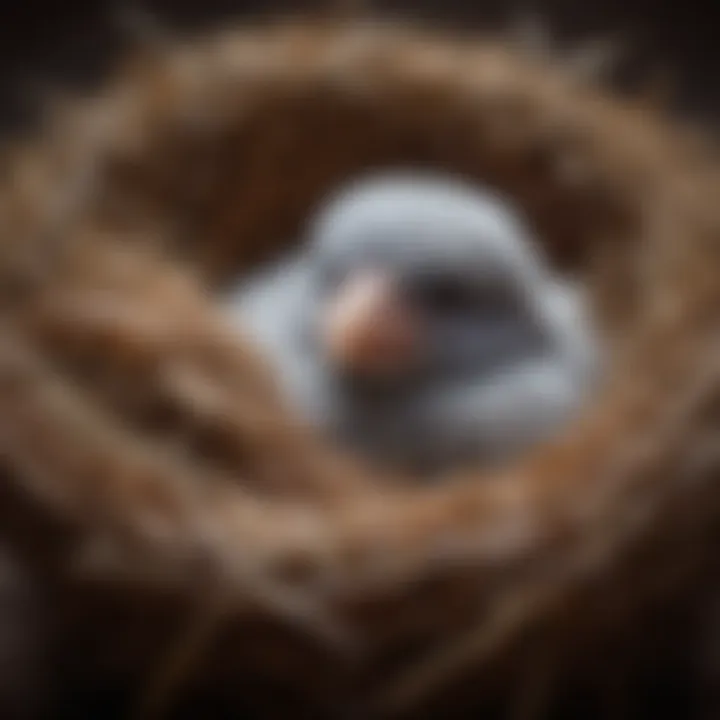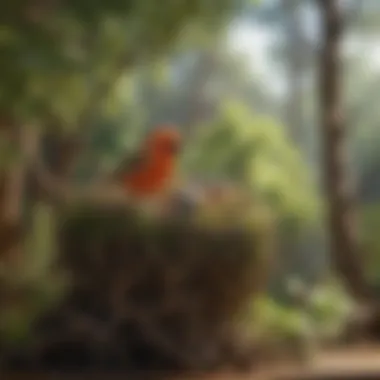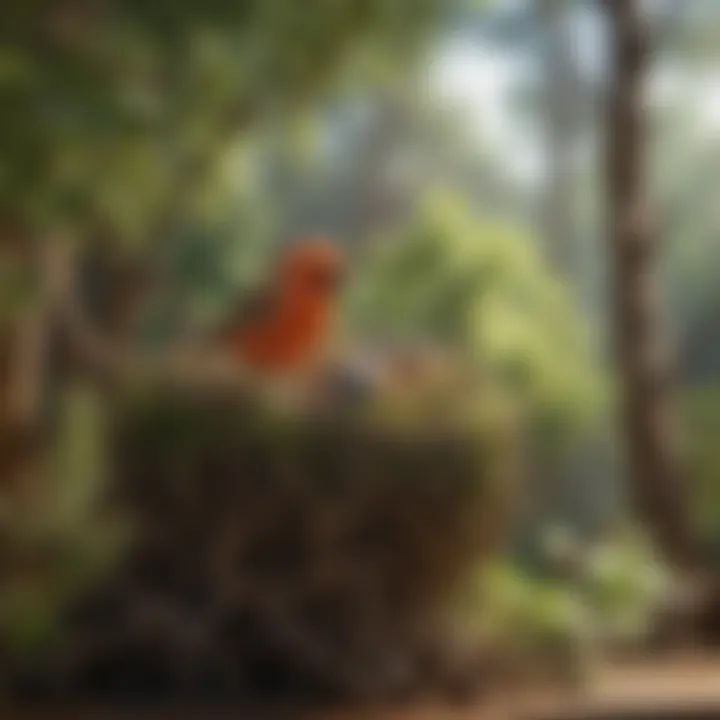Understanding Newborn Pet Birds: Essential Care Tips


Intro
Caring for newborn pet birds requires an intricate understanding of their needs and developmental stages. Newborn birds, particularly during their first few weeks, are completely dependent on their caretakers for survival and growth. This phase is critical as their physiological and behavioral attributes are still being established. Addressing the right factors can lead to a thriving avian companion.
Several elements play a fundamental role in the wellbeing of newborn birds—nourishment, environment, and socialization are essential for a successful upbringing. As bird owners, one must consider the breed-specific requirements, undertake daily care routines, and remain vigilant for any signs of discomfort or distress.
By dissecting the multifaceted aspects of avian care, owners will cultivate an environment that promotes holistic health for their new feathered family members. Let’s delve into the specific care tips necessary to ensure a smooth transitioning for newborn birds into their new lives as pets.
Care Tips
Daily Care Routines
Establishing a uniform daily care routine is vital for newborn pet birds. They thrive in consistency; thus, owners should develop a schedule for feeding, cleaning, and social interaction. Start by feeding freshly-prepared formulas or specific diets suitable for newborns at regular intervals.
Moreover, a checklist can streamline these tasks. Here are some key daily routines:
- Mornings: Inspect cages and provide fresh food and water.
- Afternoons: Spend time socializing with the bird and observing behavior.
- Evenings: Conduct a quick health check to monitor any changes in appearance or behavior.
Creating these routines will help establish a framework that works well for both the birds and the caretakers.
Cage Setup and Maintenance
An adequately maintained cage fosters a healthy life for newborn birds. Begin with selecting a spacious cage, ensuring proper ventilation and safety. Avoid cages constructed from toxic materials; opt for stainless steel or safe-coated wire cages.
Regular maintenance is integral. This includes:
- Daily spot-cleaning to remove droppings and uneaten food.
- Weekly deep cleans, washing the entire cage to eliminate contaminants.
- Monitoring the environment for too intense winds or heat that could stress the birds or disturb their peace.
Hygiene and Cleaning Practices
Hygiene is paramount in preventing health issues. Keeping the cage clean helps prevent infections or diseases that can devastate young birds. Use only bird-safe cleaning products, and make sure that there is no residue left after cleaning.
Creating a schedule for hygiene practices can assist in this endeavor. Potential components of a cleaning regimen include:
- Disinfecting food and water dishes daily.
- Replacing bedding material in the nest box as needed.
- Regularly disposing of waste.
Seasonal Care Adjustments
Different seasons bring unique challenges for newborn birds. It is essential to adjust care protocols according to seasonal changes. During the colder months, ensure they are situated away from drafts, and consider using heating pads or lamps if necessary. For summer, appropriate ventilation will help prevent overheating. Notice how the season affects their appetite; in winter, they may lose interest in eating, requiring more motivation to remain nourished.
Behavioral Insights
Understanding Bird Body Language
Birds communicate largely through body language. Observing them carefully can provide indication of stress or comfort. Waving wings or fidgeting might suggest anxiety or discomfort, while preening or chirping usually indicates contentment. Understanding these cues will foster a stronger bond and allow adequate responses to their needs.
Common Behavioral Issues and Solutions
Some behavioral issues may arise in newborn birds. Things like excessive screaming or biting can indicate unhappiness or stress. Address these behaviors promptly:
- Screaming may mean they feel ill-at-ease in their environment.
- Biters can require more socialization efforts adjusted to lessen their fear of hands or movement around them.
Positive Reinforcement Techniques
Utilizing positive reinforcement is key in training and supporting a newborn pet bird. Simple rewards like treats or verbal applauses help reinforce positive behavior. For example, rewarding tickling as an interaction can improve social engagement, setting a precedent for future activities. Repetition and patience will yield desirable behaviors.
Social Interaction Needs
Newborn birds benefit from ample interaction. Being sociable creatures, many species thrive in company. Each day, owners should spend quality time holding or talking to the birds. Not all individuals take well to cuddling right away; progress can take time.
Creating a bond enriched with understanding fosters trusts and allows thoughts and emotions to flourish within their developing stage.
Nutrition Guides
Essential Diet Components
Proper nutrition is critical for newborn birds. Start with specialized formulas recommended by the veterinarians or pet shops. As they grow, introduce seeds, pellets, and soft fruits suitable for species.
While diets will range according to species, a balance needs assured humor requirements and nutrition:
- Protein-rich offerings like high-quality pellets.
- Supplements if extra nutrients are necessary due to growth demands.
Safe and Toxic Foods
It’s crucial to be well-informed about plant toxicity. Not everything is safe for birds, featuring several everyday items.
Safe Foods Include:
- Dark green leafy vegetables such as kale and dandelion.
- Fruits such as apples (without seeds) and bananas.
Toxic Foods Include:
- Chocolate
- Avocado
- Caffeine-containing items like coffee.
Understanding the significance of safe versus unacceptable foods helps from the early stages. Prevention of dangerous intakes can lead to optimal growth and healthy life altogether.
Supplements and Treats
To support the diet, certain supplements can be useful in providing additional nutrients. Vitamin or electrolyte solutions may be worthwhile but always consult with a veterinarian prior to administering anything outside a typical diet. Only introduce treats moderately, with things like millet seeds or fruits given as training incentives but not as primary feed.


Feeding Strategies for Different Species
Bird species display a variety of digesting preferences. Species such as canaries or finches may require different feeding than parrots. Studying mate practices and adhering to expert reading friends akin to their core and behavioral needs fosters optimum care:
- For parakeets, an enriching diet of fresh food and mixture of sprouts helps creativity in their welfare.
- Lovebirds enjoy more pellet diversity alongside periodic soft foods.
Understanding tendencies for bird wellness influences aged care strategies towards ensuring balanced provisions from day one.
Wellness and Health
Routine Health Checkups
As newborn birds navigate a new world, routine checkups are greatly beneficial. Regular visits to an exotic vet experienced in avian care keep bird health at the forefront. Beyond vaccinations, these visits help establish growth patterns and transitions into dietary shifts properly.
Identifying Symptoms of Illness
Monitoring daily diligence guarantees discovery of ailments crucial for quick reaction. Symptoms such as lethargy, huddling alone, and feather loss may act as red flags.
Preventative Care and Vaccinations
Preventative care can mitigate illness risks and promote longer life. Demand vaccinations tailored toward species that the avian refers improve chance against prevalent health risks. Ask the vet directly for catered vaccination use, tailored towards their needs to gather health approaches firmly laid down.
Mental and Emotional Well-being
Attention must also go to mental health. Create engaging environments filled with social and creative stimulations afford enjoyable well-being throughout the newborn stage along with healthy bodily growth measures. Separated periods for reflective rest meanwhile notify all senses following checking behavior continuously can persuade steadiness under variable environments; this enhances vibrancy through mental expansion.
Enriching Activities
Toys and Playtime Ideas
Providing toys for newborn birds serves dual roles: entertaining the birds and fostering cognitive development. Interactive play encourages activities mimicking challenges from nature. Enrichment promotes physical activity led by curiosity and exploration of surroundings.
Training and Tricks
Birds possess remarkable ability to learn simple tricks through patience and reward-modeling techniques. Short training intervals strengthened reward features can demonstrate recall pertaining to assigned tasks.
Outdoor Activities and Interaction
Safe outdoor environments expose newborn birds to sights and sounds, expanding comfort zones while engaging senses outside of confined spaces. Beware of hazards such as direct pets around outdoor equipment ensuring non-visits disrupt environmental rests safely away without threatening factors.
DIY Projects for Mental Stimulation
Consider crafting DIY toys out of found materials. Repeat this encourages motor skills. Try collections would promote fun; weaving colorful untreated natural fabrics satisfying even designs still maintaining secure surroundings sulfuring from the infantile properties contradict settings that reinforce cohabitàtions indoors.
Promoting a bond with your newborn bird paves way for happier existence.
In summary, comprehending every attribute related to our newborn birds fosters significance in thoughtful understanding profound too. When addressing these features clouded firmly into precious keepsakes knowledge behavior leads the charge transitioning into carefully nurtured vistas revealing thrills intimately intricate pulsations within humans connected pyongs flying side gracefully enduring. This thorough comprehension unified pout while exposing the singing monuments hosting genres fascinating multiplied enchant reassurance encouragement flashing by planning societies assuring catchment care lasting lifespan organically optimally raise.
Prolusion to Newborn Pet Birds
Caring for newborn pet birds is a matter that requires significant attention. The early days of a bird's life are critical for its future health and development. During this stage, owners must understand the specific needs of their newly acquired companions. Failing to provide the right care can lead to lasting issues that affect the physical wellness and behavior of the bird throughout its life.
Different species of pet birds exhibit diverse behaviors and nutritional needs. Being informed about commonly kept species aids new owners in preparation for the specific demands of their chosen avian friend. A well-prepared environment and correct care routine become the cornerstones of raising a healthy, socialized bird, setting the stage for long-term companionship.
Importance of Early Care
Early care for newborn birds is paramount due to the vulnerable state of their health. This early phase defines how well they will adapt to their new household. It is also when significant bonding and trust-building takes place. Providing consistent warmth, proper nutrition, and attention can significantly decrease stress in newborn birds. These practices underpin not only their physical health but also help pave the way for emotional and behavioral stability as they grow.
Proper medical attention early on further enhances their chances of thriving. Engaging a veterinarian for routine check-ups ensures any budding health issues are identified promptly. As newborn birds transition from themad all too early would be detrimental to their needs for care and attention.
Common Species of Pet Birds
Knowledge about commonly kept species helps potential owners choose the suitable pet for their situation. A few notable species include:
- Budgerigar (Budgie): Marked by their friendly demeanor. Budgies adapt well in social situations. They typically require interaction and mental stimulation.
- Cockatiel: Recognized for their playful nature and ability to learn to whistle. Their social interaction significantly builds upon their intelligence and comfort in household settings.
- Lovebird: Renowned for their affectionate behaviors. They often need companionship. This includes socializing not just with humans but also with fellow lovebirds in some instances.
- Conure: Active and lively, these birds display a strong preference for socializing. They participate in various types of engagement activities, which keep their mental health at an optimum level.
New bird owners should recognize that species distinction comes with different energy levels and specific longevity expectations. This helps determine the environment and caloric intake necessary, scaffolding a focused care tactic from the onset of the ownership.
Understanding these aspects ensures that both the birds and their owners can enjoy enriching experiences together while fostering a bond that nurtures mutual growth.
Developmental Stages of Newborn Birds
Understanding the developmental stages of newborn pet birds is crucial for their health and well-being. Each phase presents unique needs and characteristics that determine how they should be cared for. This knowledge allows pet owners to adjust their care strategies effectively. Inadequate or inappropriate care during any stage can lead to significant physical or behavioral issues down the line. Recognizing these phases supports the growing bond between the bird and its owner. With attentive and informed care, the bird can thrive both psicologically and physically.
Hatching Phase
The hatching phase marks the beginning of a new life for pet birds. During this time, the chicks have just emerged from eggs. This period is critical because they depend entirely on their parents or caretakers for warmth and nutritional support. Bird owners should prioritize a stable environment to minimize stress after a chick hatches.
The key factors during this phase include:
- Temperature Stability: Newly hatched birds require a warm surrounding, typically around 85°F to 90°F (about 29°C to 32°C) for the first few days.
- Nutrition: If the parent birds are not feeding them, owners can provide a specialized feeding solution to ensure they meet their dietary requirements.
- Hygiene: Keeping the nesting area clean is vital to prevent infections that could jeopardize their fragile health.
It's common to observe behaviors, such as peeping and small movement, signaling their orientation in the nest. Understanding these subtle actions will enhance how owners support their needs during this phase.
Juvenile Development
As newborn birds transition from hatching, they progress into the juvenile development phase. This period typically spans several weeks post-hatching. During this stage, the birds' feathers begin to develop, and they start to explore their surroundings. This is a formidable time for learning vital skills necessary for survival and interaction.
Juvenile birds undergo several stages of development:
- Partial Feathering: Initially, they are covered in down feathers, which provide little insulation. As time goes on, their flight feathers begin to appear, enabling them to take short flights.
- Sociability: Young birds reflect developmental behaviors, showcasing their need for social interaction. It is essential for will to have positive engagements, as these experiences cultivate trust and social skills.
- Vocalization: Birds may start mimicking sounds during this stage. Encouraging them positively will support their cognitive development.


Pitfalls during this phase can hinder their progression and social competencies. Owners should create a stimulating environment that encourages exploration and learning through safe interactions and observation.
Maturity Milestones
The final phase of development leads to maturity, generally referred to as when birds are fully grown and can participate in breeding behaviors. This phase can vary significantly depending on species. Understanding these maturity milestones can help owners capably care for their pet and appropriately plan for future enhancements in their care.
Mature birds should exhibit:
- Social Behaviors: They now engage in more complex social structures within their environment, requiring tailored social interaction to remain balanced.
- Establishment of Territory: Some species develop territorial behaviors that can encompass certain preferences regarding space or relationships with other birds.
- Health Monitoring: As they mature, birds may become susceptible to specific health concerns that arise within this maturity phase. Regular veterinary check-ups become crucial to catch any health issues early on.
Nutritional Needs of Newborn Birds
Understanding the nutritional needs of newborn birds is essential for their growth and overall health. Proper nutrition lays the foundation for strong physical development, immunity, and long-term wellness. New bird owners must familiarize themselves with the dietary requirements of their feathered companions at this stage. Failure to provide adequate nutrition can lead to developmental issues and health-related problems.
Role of a Balanced Diet
A balanced diet is integral to the health of newborn birds. Newly hatched birds rely heavily on their parents for food until they are able to feed themselves. An appropriate diet provides essential vitamins, minerals, and proteins that support various bodily functions and help build a robust immune system.
It is crucial that the dietary composition consists of organic products without preservatives. As the juvenile birds grow and transition to eating independently, educating themselves about their dietary needs becomes important because this will guide them towards providing a healthy diet. Key components of a balanced diet include:
- Proteins: Found in nuts, seeds, and specially-formulated breeding diets.
- Vitamins and minerals: Derived from fresh fruits and vegetables.
- Essential fatty acids: Sourced from avocado or flaxseeds in moderation.
A well-balanced diet fuels the growth of newborn birds and helps them develop resilient bodies.
Recommended Foods for Newborns
Selecting correct foods for newborn birds can ensure they receive proper nutrition. Options for feeding young birds vary depending on the species. However, some common recommendations include:
- Hand-feeding formulas: Frequently used for hand-raised birds, these formulated blends cater to specific young birds' needs. Brands like Kaytee and Harrison's are reputable options for hand-feeding.
- Fresh fruits and vegetables: Chopped apples, carrots, broccoli, and leafy greens offer vitamins and fibers beneficial for growth. Monitoring which fruits and vegetables suit your bird is essential.
- High-quality seeds and pellets: For those transitioning to independent feeding, using optimal pellets ensures they receive essential nutrients. Avoid low-quality mixes that lack vitamins and have excessive fatty seeds.
When introducing new foods, observe how your bird responds. Changes in diet should be gradual to avoid gastrointestinal stress or shock.
Hydration Requirements
Hydration is a crucial aspect that sometimes gets overlooked. If safely consumed, fresh water should be accessible at all times for newborn birds, as hydration directly affects their behavior and health. A well-hydrated bird enjoys enhanced metabolism and has lower chances of health risks.
In addition to water:
- Supplement their diet with moist foods like fruits. The moisture in fruits like watermelon provides additional hydration.
- Change the water regularly to ensure cleanliness to prevent bacterial growth and potential health hazards.
Ultimately, ensuring that hydration needs are met supports healthy growth and activity levels. The duration from hatching to maturity may pose distinct dietary challenges, and proper parsing or consulting with regional avian specialists can strengthen your focus on hydration.
Creating a Suitable Environment
Creating a suitable environment is crucial for newborn birds as it significantly impacts their development and well-being. A well-structured habitat can mimic their natural surroundings, making it easier for them to thrive. This approach prevents stress and fosters a safe space for exploration and growth. Concentrating on housing and environmental factors sets the foundation for a healthy life for these young avians.
Optimal Housing Conditions
Choosing the right housing and ensuring optimal conditions is one of the primary responsibilities of pet bird owners. The housing should be spacious enough for the birds to move freely. A cage that allows for climbing and swinging can enhance their physical development. A good guideline is to look for cages that are at least three to four times the wingspan of the bird.
Some important factors to consider include:
- Cage Material: Stainless steel or powder-coated metal is preferable. It’s durable and easy to clean.
- Bar Spacing: The bars should not allow the bird to escape or trap its head; a spacing of ½ inch to ¾ inch is typically ideal.
- Perches: Include perches of different diameters to promote foot health. Add textured perches to help with grip.
- Space Utilization: Use the vertical space in the cage. Hanging toys and ramps can provide both enrichment and exercise.
To maintain vigilance over hygiene, keep a regular cleaning routine. This is vital because a dirty living area can lead to illness and discomfort.
Temperature and Humidity Control
Temperature and humidity control are fundamental aspects often undervalued in avian care. Newborn birds are sensitive to environmental changes, making consistent conditions essential. They thrive at a temperature range between 70°F and 80°F. If temperatures dip too low, they can become hypothermic, leading to health problems.
Maintaining proper humidity levels is also important; ideally between 40% and 60%. Such humidity is critical for their respiratory health and feather development. The following methods can help:
- Thermometers and Hygrometers: Install these devices in the bird's area to monitor microclimates easily.
- Heating Lamps or Pads: During colder months, consider supplemental heat sources. Ensure they are safely positioned to avoid burns.
- Humidifiers: In dry climates, using a humidifier can help sustain necessary humidity levels.
Adequate control of temperature and humidity contributes to a golden habitat where newborn birds can develop optimally. Striving for an effective combination promotes overall growth and health.
Understanding the specifics of housing and environmental controls can empower pet owners to foster better living conditions for their newborn birds, enhancing their quality of life significantly.
Behavioral Observations in Newborn Birds
Behavioral observations play a crucial role in understanding the development and overall health of newborn birds. Owners must be attentive to their pet birds' behaviors, as these can reveal significant insights into their emotions and needs. Healthy behaviors can reflect a well-adjusted bird, while unusual or concerning behaviors might indicate problems. This subsection aims to highlight elements such as body language, social interaction needs, and signs of distress or illness.
Understanding Body Language
Newborn birds exhibit body language that is critical for expressing their needs and emotions. Recognizing these signals can help owners create a supportive environment. For instance, a bird that appears puffed up may be feeling chilly or unwell. Conversely, a bird that stands tall with an upright posture typically communicates confidence and comfort.
Key body language indicators include:
- Wing flapping: This can indicate excitement or playfulness.
- Tail fanning: Often signifies alertness.
- Head bobbing: Generally a way to attract attention or solicit interaction.
- Chirping or peeping: Vocalizations often highlight contentment or the seeking of attention.
By carefully interpreting these signals, pet owners can address their birds' needs, promoting a positive living environment. This sensitivity to body language can bridge the trust between owners and birds, fostering healthier relationships.
Social Interaction Needs
Newborn pet birds are inherently social creatures. Hence, providing opportunities for interaction is essential for their well-being. Engaging with your birds helps in their behavioral development and boosts their confidence.
Effective social interaction can be achieved through:
- Daily handling: Gentle handling during brief periods can familiarize the bird with human touch, helping them adjust better.
- Talking and singing: Verbal engagement can stimulate a bird's mental development and foster a bond.
- Introducing companions: Where applicable, introducing another bird can fulfill the need for companionship, leading to improved social skills and happiness.
Birds deprived of adequate social interaction may exhibit signs of anxiety or distress. It is imperative for budding bird owners to understand and proactively meet these socialization needs.


Signs of Distress or Illness
Observing signs of distress or illness in newborn birds is vital for timely intervention. Early detection can be the difference between a successful recovery and severe health issues.
Some common indicators to be vigilant for include:
- Lethargy: A noticeable decrease in activity and engagement.
- Fluffed feathers: Birds that consistently fluff their feathers may be trying to retain warmth or indicate illness.
- Changes in droppings: Unusual sizes, colors, or frequencies can be red flags.
- Loud or tapered vocalizations: Deviations from normal sounds could signal distress.
Early veterinary visits should be a priority when these signs are present, as they can lead to critical insights and appropriate treatment options. Maintaining consistent behavioral observations aids potential owners in detecting issues sooner rather than later, directly correlating to overall health outcomes.
"A pet bird's emotional state is as crucial as its physiological health. Owners who prioritize behavioral observations set the stage for a harmonious relationship with their avian companions." - Anonymous
Healthcare for Newborn Birds
Healthcare is a crucial aspect of raising healthy newborn pet birds. Just like any other young animal, they are vulnerable to a range of health issues that can impact their growth and development. Early intervention can make the difference between a thriving bird and one that faces significant health challenges. Regular veterinary care ensures that these birds receive essential health assessments and recommendations suited to their specific needs.
Routine Veterinary Check-Ups
Regular veterinary check-ups serve multiple important functions. One primary aim is to detect potential health problems before they become severe failures. Young birds may present subtle signs of illness that are easy to miss for an unsuspecting owner. In fact, many common ailments in birds can escalate rapidly without early vet intervention.
During a check-up, the veterinarian typically conducts a physical examination, assesses the bird’s weight, and observes their overall demeanor. Blood tests may also be recommended for more comprehensive checks. The vet will provide valuable tips on handling and care, certain supplements, and dietary recommendations.
Key components of routine check-ups include:
- Identifying early signs of diseases
- Maintaining optimal weight and nutrition
- Consulting on necessary behavioral observations
- Providing a vaccination schedule
Parents of pet birds should also find and establish a relationship with an avian veterinarian, specializing in birds. This way, your young birds will have an expert monitoring their health tailored specifically for them.
Vaccination and Preventative Care
Vaccinations play a pivotal role in preventing common diseases in newborn birds. Parrots, finches, and other young birds can be susceptible to health issues that vaccinations may help avert. It is essential for bird owners to engage in preventative healthcare measures, especially in those early months after hatching.
Preventative care lays a strong foundation for your bird's lifelong health.
Depending on the species, relevant vaccinations may include:
- Avian Viral Pneumovirus
- Polyoma Virus
- Psittacine Beak and Feather Disease
After determining a vaccination schedule and methods with the vet, presence of clean and stimulating environment is likewise essential. A healthy state helps strengthen a bird's immune system. Social interaction and diverse food choices also keep habits and health in check.
In summary, ongoing healthcare through regular veterinary check-ups and thorough focus on vaccinations can support bird owners' efforts in ensuring their newborns develop into healthy, happy companions.
Introducing Newborn Birds to Their Owners
Introducing newborn birds to their owners marks a pivotal stage in the journey of raising a pet bird. This moment is as much about the human bond as it is about masking their initial stress and ensuring a calm transition into their new environment. New bird owners need to comprehend increasingly that the opportunity for establishing trust during this period can influence the behavioral development of their avian companions immensely.
Greeting a new feathered friend involves understanding and patience. Inadequate handling might lead to fear or even aggression, hindering bonding. Thus, every encounter reflects an essential part of their integration into a family.
Building Trust and Bonding
Establishing trust is the cornerstone for any relationship. In the case of young birds, they often arrive in their new homes widely familiar with their parents but potentially wary of humans. Being gentle and consistent in interactions helps in acclimatizing newborns to people.
First impressions count fully; quieter and less chaotic environments foster comfort. Owners should allow the birds time to get used to their setting. Speaking softly can aid this acclimatization process as well as encourage familiarity through aroma from the spacious shared habitat.
A crucial aspect of bond-building involves routine. Keeping regular feeding and cleaning schedules will instill a sense of security in the birds. Trust develops as they learn the conditions they consistently experience offer safety, and that they can expect human engagement is still positive and non-threatening.### It's vital to note:
- Start slowly.
- Focus on routine.
- Be patient.
Birds often communicate feelings through subtle body language. Owners must observe signs of comfort or anxiety, reacting accordingly. A cozy, attractive space or some gentle, engaging toys will further enhance the trust they feel with their owner
Enrichment Activities for Young Birds
Providing enrichment activities for newborn pet birds is not just a luxury but a necessity. Proper enrichment helps in promoting mental health and physical vitality. It provides stimulation that is essential during crucial developmental stages. Birds are intelligent creatures and require mental challenges to grow and thrive. Engaging them require consideration in different forms, from toys to socialization.
Toys and Socialization
Toys serve multifaceted purposes in the lives of young birds. They educate through exploration, physical exercise, and cognitive stimulation. Some toys offer tactile experiences, while others can be colorful, enticing young birds to explore.
- Types of Toys:
- Natural wood blocks: Encourage pecking and chewing.
- Bells: Activate auditory senses and can improve engagement.
- Mirrors: Enhance self-recognition and curiosity.
Socialization is equally critical during early development. Birds are inherently social animals and thrive in social settings. Introducing them to gentle interactions assists in nurturing trust and companionship. Handle them with care, and engage them slowly to foster familiarity.
Interactive Playtime Ideas
Interactive playtime stimulates healthy development while solidifying bonds between owner and bird. Simple activities can be highly beneficial. Each engagement offers new opportunities for learning and confidence building.
- Consider tug-of-war with soft toys: Use safe fabric items, ensuring gentle interaction.
- Hide and seek with treats: Safely hide snacks in various areas for birds to discover.
- Interactive flying time: Safely allow them to flap their wings in a controlled environment.
Ultimately, understanding and creating a system of enrichment ih Highly promote long term happiness for birds. As the quote suggests, > “An engaged bird tends to be a happier and healthier bird.”
Closure and Key Takeaways
In summarizing the important aspects of caring for newborn pet birds, it is vital to recognize the intertwining elements that contribute to their overall health and development. Understanding these key points establishes a garden bed of information that enriches the lives of both the birds and their owners.
The nurturing journey begins with recognizing the early care requirements. Newly hatched birds have distinct needs, from proper nutrition to environmental conditions. Knowing the best practices not only promotes physical well-being but fosters an atmosphere where socialization and bonding can flourish. Additionally, understanding their behavioral cues becomes paramount in ensuring that pet birds are happy and thriving.
Summary of Best Practices
Cared by learning about their specific need and behaviors. Some major best practices include:
- Suitable Housing: Provide an environment that ensures safety and comfort. Proper cage fittings and natural elements create familiarity and security.
- Balanced Diet: Offer age-appropriate balanced diets with necessary vitamins and minerals for optimal growth. Foods for baby birds require special attention.
- Social Interaction: Regular interaction use builds trust and encourages healthy development.
- Consistent Monitoring: Keep a keen eye on changes in behavior that might suggest distress or illness. Early intervention often leads to better outcomes.
Future Considerations for Bird Owners
Proper care for newborn birds isn't a temporary endeavor. As these feathered companions grow, their needs evolve. Future considerations should encompass:
- Behavioral Expectations: New habits can shape as the birds mature. Anticipate changes.
- Upgrade Environments: Adapt environments to fit the physical and mental expansion of the birds.
- Continual Education: Stay informed on avian behaviors and needs through literature and community sources, such as reddit, that share experiences and insights.
Education begins and continuously renews. Owners have the unique opportunity to engage in lifelong learning for the enrichment of their pet birds. Whether through regular veterinary visits, proper social interactions, or understanding their communication, the proactive approach optimally supports a thriving avian friend. Thus, the well-rounded care of these newborn pet birds ameliorates both their physical growth and the bonding experience shared with their human guardians.















